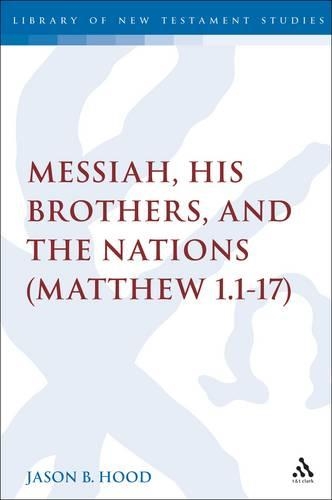
The Messiah, His Brothers, and the Nations: (Matthew 1.1-17)
(Hardback)
Available Formats
Publishing Details
The Messiah, His Brothers, and the Nations: (Matthew 1.1-17)
By (Author) Jason B. Hood
Bloomsbury Publishing PLC
T.& T.Clark Ltd
26th May 2011
United Kingdom
Classifications
Tertiary Education
Non Fiction
Criticism and exegesis of sacred texts
New Testaments
226.207
Physical Properties
Hardback
208
Width 156mm, Height 234mm
Description
Why does Matthew append and his brothers' to Judah and Jechoniah (1:2, 11) Secondly, why does Matthew include the following four annotations: and Zerah by Tamar', by Rahab', by Ruth', and by the [wife] of Uriah' (1:3-6) Jason B. Hood uses a composition critical approach in which he examines biblical genealogies and summaries of Israel's story' in order to shed light on these features of Matthew's gospel.
Hood asserts that he addition of and his brothers' recalls Jesus' royal role. Judah and Jechoniah in Second Temple literature are both understood to have reversed their wickedness and earned royal status by self-sacrifice, perhaps pointing to the self-sacrifice of Jesus for his brothers before his full enthronement. A review of scholarly explanations of the significance of the four (five) women' in the genealogy, unearths an overlooked interpretation - Matthew does not name four women in 1:3-6 but four Gentiles (Tamar, Rahab, Ruth and Uriah) traditionally celebrated as righteous.
Reviews
Hoods solutions are attractive and certainly worthy of consideration. * Religious Studies Review *
The book is useful for its extensive summaries of previous research, and its suggestion to shift the focus of interpretation from Bathsheba to Uriah is a welcome reminder of previous studies...The early emphasis on genealogies as having narrative functions akin to those of summaries of Israel's history is intriguing...there is some valuable material in this dissertation. -- Boris Repschinski * The Catholic Biblical Quarterly *
Author Bio
Jason B. Hood,is Scholar-in-Residence at Christ United Methodist Church, Memphis, TN. His published works have appeared in a variety of academic texts and journals, including the Journal of Biblical Literature.
